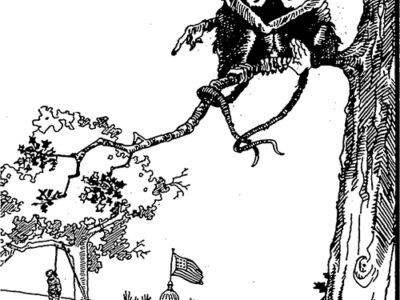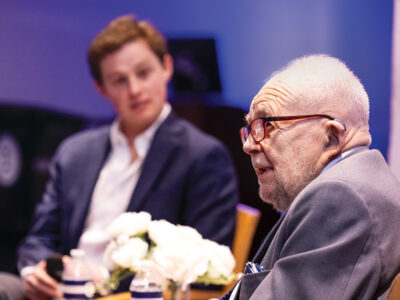
At another time and place, the gatherings would have seemed tailor-made to bring joy to anti-Semites and grief to the Anti-Defamation League. Even in the here and now, they were enough to wrack some nerves. Roughly two dozen scholars had traveled to Penn from as far away as France, Poland, and Australia. For several months they would cloister themselves in discussion groups and seminars. Then they would deliver public lectures with titles like “Jews and Money: The Secrets of Success,” “Jews and the Slave Trade: Between Myth and Reality,” and “For God or Commerce? Oliver Cromwell and the Jews in 17th-century England.”
The Herbert D. Katz Center for Advanced Judaic Studies has been sponsoring yearlong fellowship programs since 1993, but rarely have they been organized around so provocative a theme as this year’s edition. Under the rubric “Jews, Commerce, and Culture,” the 2008/2009 Katz fellows focused on the intersection of Judaism and economics, from the Middle Ages to the present day. Current events lent an unexpected frisson to the proceedings. Three weeks before the first public lecture, the Wall Street collapse found its poster boy in Bernard Madoff, whose arrest led many of his coreligionists to fear a surge in global anti-Semitism.
“We never imagined how timely this topic could be,” said Katz Center director David Ruderman before the opening lecture in a series co-hosted by Wharton. “For some reason, the world seems to have radically changed in the last couple of months—both in a universal sense, and also in a particular sense focusing on a part of the Jewish community.
“I think there is much to learn about the context of Jewish economic life,” he continued, “and the scholars we have assembled … have very much to teach us.“
Yet for many in the academic realm, focusing on Jewish economic roles through history involves more than a little apprehension.
“Anyone who surfs the Internet,” noted University of Haifa historian and Katz fellow Adam Teller during a radio interview, “knows that there’s a huge amount of hate floating around, much of it focusing on Jewish economic activity. So when you bring this topic out into the open, the immediate reaction of many Jews is, ‘Oh my god, you’re going to create more anti-Semitism! We’ve got enough already!’
“On the other hand,” he added, “some of the scholars who have written about this say that they’re being quoted in this hate literature. And that’s an awful feeling for someone who’s trying to be open and honest and work on this, to suddenly realize that their ideas are being taken out of context and being used to create more hatred.”
As a result, “Jewish history has often appeared almost like a head without a body,” in the words of Jonathan Karp, a Katz fellow from the Department of Judaic Studies at Binghampton University/SUNY. “Intellectual and spiritual life” has been overemphasized “to the neglect of perhaps more mundane matters, particularly the economic history of the Jews,” which has been “sort of like a skeleton in the closet.”
That made the communal nature of the Katz Center fellowship program—which hosts participating scholars in Philadelphia for the entire academic year—particularly valuable. “I think the field of Jewish history had become so habituated to sidelining this topic,” Karp says, “that we found we really needed larger numbers to try and stir the pot and get things going again, intellectually. Creating a community was so important.”
Each of the fellows approached the theme from a different direction. Lectures, several of which can be seen in streaming video on the Katz Center’s website (http://www.cjs.upenn.edu), delved into topics ranging from the liquor trade in 19th-century Poland, to the clothing trade in antebellum America, to the business history of rock-and-roll.
These snapshots occasionally added up to give a broader historical panorama. In one of his lectures, Karp addressed the origins of the merchant tradition within European Jewry. “What’s interesting is that the Jewish Diaspora in antiquity was not commercial in orientation,” he noted. “Our records seem to indicate that those Jewish communities were populated by farmers, agriculturalists, landowners, craftspeople—mercenaries even—but on the whole, not predominantly by merchants.”
Yet by the 11th century, Jews were strongly associated with commerce and trading by anti-Semites and philo-Semites alike. In 1084, a German bishop named Rudiger recorded this sentiment in an official charter for a city named Speyer. “In the name of the holy and undivided trinity,” Karp recited from the document, “when I wish to make a city out of the village of Speyer, I, Rudiger, thought that the glory of our town would be augmented a thousandfold if I were to bring Jews to it. I have accorded them the free right of exchanging gold and silver, and of buying and selling everything they use.”
This dynamic would recur again and again in feudal Europe, as Christian elites seized on the notion that the presence of Jewish moneylenders and merchants would bolster economic growth in their predominantly agrarian estates. As feudal economies evolved toward capitalism, and more Christians entered similar economic roles, Jews would sometimes respond to that competition by migrating to less-developed areas—where the cycle would begin again. “So Jews often served, in this sense, as pioneers of economic development in areas that had been marginal, frontier areas,” Karp observed. In this way, their mercantile reputation preceded them, creating a sort of feedback loop leading to “their disproportional participation in certain occupations, including business.”
Of course, this dynamic has in turn fed into anti-Semitic sentiment.
“The fact that Jews had so often to deal with [dislocation and change],” said Adam Teller, “meant that Jewish economic actors had cultural ideas and tools and ways of dealing with change—while non-Jewish society, which was much more settled and agrarian, and also used to the system, found it much more difficult to re-adapt.
“It was also a reason for resentment,” he added. “Where Jews were able more quickly to come to terms with a new situation and to make best use of it, the other groups who were trying to do the same but were doing it more slowly, found the Jewish success extremely irritating—and often blamed the Jews for [bringing about] the changes [to begin with], rather than seeing that the Jews were using the changes slightly more effectively.”
The Katz program on “Jews, Commerce, and Culture” will eventually take the form of a published volume. Many of the participants hope that it will also spur renewed interest in an understudied aspect of Jewish history.
“Jews’ economic roles have been a lightning rod for criticism, for brutal and bitter and slanderous attacks on Jews from the Middle Ages to the present,” Jonathan Karp observed during the year. “But there’s a real history here as well as a set of ideas and fantasies and stereotypes. There is some area of overlap between those two, but for the most part they are in opposition to one another. Yet how can we possibly dispel the false notions if we don’t sometimes publicly engage in this discussion?”
—T.P.




